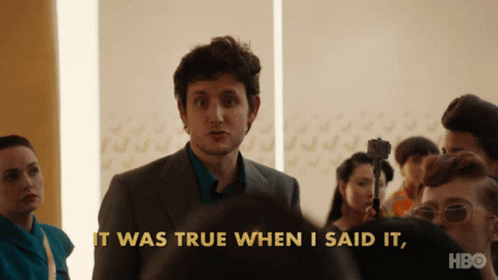
Honesty, Error, Deception, Fraud
I’m with John Boyd on this one: the closer to you look at something, the more distinctive the contradictions you’re going to see, all the way down as far as you can squint. In this post, I’ll look at the distinction between honesty, error, deception, and fraud – and will conclude with a heuristic.

We don’t experience ground truth. We experience something as a result of data that flows into our skull that is constructed into something approximating an experience. But we don’t ever truly experience a state of ground truth. And this isn’t meant to be some kind of satire about who’s to say what is really true and what is really untrue given how one feels about the world or what one believes in their heart of hearts to be true. It’s to make an observation about the nature of how the networks in our skull create a representation of the Universe for us to make sense of. And, it likely follows that everybody has a different way that their unique networks inside their skulls constructs what approximates an experience.
Emitting data about your experience without the intent of deception can be labelled as honesty. I can report that as I type this sentence, I do not have the intent to deceive you, the reader, of these words.
Sometimes, I make prospective statements about the future that do not turn out to be experienced as true. I once declared that with 4:1 odds, on a wet race track, that a $2 Win-Place-Show bet on Pink Princess would yield a positive return. I had intended for my statement to be true. I had estimated that it would be true. But it turns out that I was in error. Although Pink Princess herself did technically experience a victory because she got to go for a run in the rain with some other horses and enjoyed an apple afterward, Pink Princess did not cross an arbitrarily placed white line before three of her peers, and as a result, I did not experience a positive sum in my wallet. Moreover, I believe that the outcome of Pink Princess not winning the race is completely independent of my wager. And, if I could go back into the past and have updated my priors with the knowledge about the future, I would reverse that error. My intent was not to deceive, but what I said would happen did not happen. I was in error.
Acting is an act of deception. I used to enjoy athletic theatre a child. We all suspend disbelief when Macho Man Randy Savage is acting like a Macho Man, not because we all literally believe that Macho Man Randy Savage is earnest in fighting for the hand of Elizabeth against Hulk Hogan at Wrestlemania, but because we all enjoy suspending disbelief for three hours while we take in the pageantry and spectacle of a display of total heterosexual masculinity, in spite of what we can all see with our eyes: two sweaty, muscular men, clad in spandex, engaged in close physical contact, rubbing up against each other, engaging in an act of mass denial. Sure, it’s all totally straight because they both want to get with Elizabeth. Sure it is. Sure.
Sometimes we accept roles in life that obligate us to engage in deception. For instance, when I am engaged in a negotiation on behalf of the corporation, I am obligated to engage in deception about our BATNA. As a society, such that it is, collectively, we have come to accept some forms of deception as a condition of social license: You don’t go to an arena and remind everybody around you that the wrestling is fake (because all the fans are in fact, fake), you don’t tell the water provider that you’re willing to accept up to a 1.99% increase in the service fee just for the conversation about filtered water to be over, and, you tell Joe that those shoes look fine but only if he asks. In part, it’s what made Ricky Gervais’ The Invention of Lying (2009) a fantastic experience about truth and deception. We engage in deception for reasons that are arbitrarily compassionate, including, strangely, compassionate towards ourselves.
Because sometimes we deceive ourselves.
Season 13 Episode 5 of South Park is best known for the meta-meta-joke targeting a celebrity with the worst sense of humour with a joke about fish sticks. However, I remember it for how Eric Cartman self-deceives himself into believing that he wrote the Fish Sticks joke. Eric literally believes that he wrote the joke. It’s satire in the sense that Eric Cartman, himself, is not a real human. But it isn’t satire in the sense of the phenomenon of self-delusion. Such people experience what Eric Cartman experienced with respect to the attribution of the Fish Sticks joke. And, they aren’t even aware of the act of self-deception. It seems to occur entirely outside of their own consciousness. It isn’t merely mis-remembering, as though there is some error in the way that storage and recall occurs, but, there is an active re-construction of reality so as to protect the identity. Isn’t that wild?
When you engage in deception to separate other people from their property, we label it as fraud. I’m not a lawyer, but the definition is something like: “larceny, theft, embezzlement, forgery, misappropriation, wrongful abstraction, wrongful conversion, willful misapplication or any other fraudulent or dishonest acts resulting in financial loss.” Fraud creates so much harm that the state has to intervene to secure its interests. In some societies, even a well-connected person, somebody who earnestly believes that laws don’t apply to them, can find themselves mysteriously convicted of fraud, and be exiled to a facility where they only play tennis at most once a day, with thread counts that can only be described as medieval! It’s that serious. Fraud is punished because it generates considerable second and third order effects, and the state simply has to defend its interests. The belief of equal application of the law has to appear to be true for property rights to remain secure enough to produce taxable transactions. And, non-cynically, it’s through the securing property rights that we secure temporary relief from the absolute catastrophe of thriving on a planet that is indifferent to human suffering.
In part, this distinction between fraud, belief-speaking (Cooper, B., Cohen, T. R., Huppert, E., Levine, E. E., & Fleeson, W. (2023)), error, and gender is why the Liubertė, I., & Dimov, D. (2021) paper is such a difficult read for so many. The paper itself is about the construction of Futurescapes, using Elizabeth Holmes statements about the picture of the future she was promoting as a founder. Was Elizabeth fraudulent, self-delusional, or merely punished because she was a woman engaging in belief-speaking bullshittery that every male Founder in the Bay Area is demanded to perform as a condition of entry to the game? Was Elizabeth merely behaving as an investible entrepreneur? Or was she engaged in fraud? She had a trial and there was a verdict. There was a trial in the court of public opinion, and there was also a verdict.
Ever confused about the nature of Canadian humility and American bragadocious-ity, I went back to PT Barnum’s (1888) book: The Life of PT Barnum: Written by Himself, Including His Golden Rules for Money-making. Brought Up to 1888. Two things struck me. The title itself is the height of the art. The longest word has three syllables, and it gives the audience exactly what it wants: authenticity, currency, and currently (au courant-cy doesn’t work as a word does it…?). And in the text itself, he explains that everybody is trying to get one over on everybody else, and that everybody expects a little bit of humbuggery in life. Is that self-delusion or convenient reasoning? PT Barnum goes on these epic tangents about the line between honesty, deception, and fraud, including a dispute he had with a business partner about the size of a banner with a representation of a mermaid outside the building. It’s wild. I can’t tell what he truly believes. Was he as self-deluded as Eric Cartman? I’ll never know. Was PT Barnum self-aware enough to know? Could he have ever known? I’ll never know.

If you accept the assumption that none of us ever experience ground truth anyway, given the ambiguous nature of experience itself, and the fact that if you’re extremely self-deluded then there really isn’t any obvious way of knowing it, then, the truth table is pretty obvious, isn’t it?
Every decision leads to trying.
Try
You should try.
Try to be as honest with yourself as you can be. Try to learn from your errors so that you can improve. Try to enjoy the socially acceptable forms of deception, as your face has nerves that enable deception for a reason, and, it really is a wonderful social lubricant. And try not to separate people from their property through deception.
Unless I’m in error, those heuristics ought to generate some pretty great outcomes for yourself, and everybody around you.
Sources
Barnum, P. T. (1888). The Life of PT Barnum: Written by Himself, Including His Golden Rules for Money-making. Brought Up to 1888. Courier Company.
Cohen, M. D., March, J. G., & Olsen, J. P. (1972). A garbage can model of organizational choice. Administrative science quarterly, 1-25.
Cooper, B., Cohen, T. R., Huppert, E., Levine, E. E., & Fleeson, W. (2023). Honest behavior: Truth-seeking, belief-speaking, and fostering understanding of the truth in others. Academy of Management Annals, 17(2), 655-683.
Harris, R. (2009). The institutional dynamics of early modern Eurasian trade: The commenda and the corporation. Journal of Economic Behavior & Organization, 71(3), 606-622.
Littrell, S., & Fugelsang, J. A. (2023). Bullshit blind spots: The roles of miscalibration and information processing in bullshit detection. Thinking & Reasoning, 1-30.
Liubertė, I., & Dimov, D. (2021). “One tiny drop changes everything”: Constructing opportunity with words. Journal of Business Venturing Insights, 15, e00242.
Perez, B. (2021). An Ethnography of the Pitch: Techno-Entrepreneurial Capitalist Ethics at Y Combinator.
Mollick, E. (2020). The Unicorn’s Shadow: Combating the Dangerous Myths that Hold Back Startups, Founders, and Investors. University of Pennsylvania Press.
Von Hippel, E., & Von Krogh, G. (2016). Crossroads—Identifying viable “need–solution pairs”: Problem solving without problem formulation. Organization Science, 27(1), 207-221.
